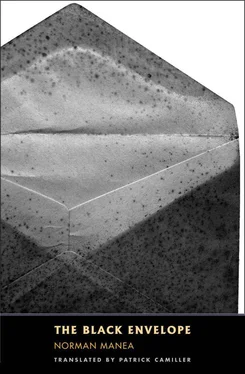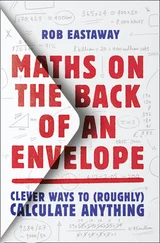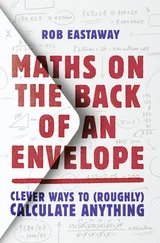Tolea lay in bed, thinking. More furious than delighted at the memory of the photo file with which Mrs. Venera had honored him.
MORNING, AFTERNOON, SHUT UPindoors. An ever so long, ever so wide, never-ending Sunday. Timeless time, outside time.
A deaf-mute Sunday: he did not answer the telephone, nor did he hear when his neighbor, Gafton, knocked timidly on the door, once and then once more. Tolea lay in bed, thinking. He was furious. He kept remembering the Saturday trap. The portfolio with the Cu  a photographs had not offered the long-awaited key. It infuriated him, the portfolio infuriated him, although he did not quite know why. Had he really discovered nothing? Had he discovered too much, without discovering anything?
a photographs had not offered the long-awaited key. It infuriated him, the portfolio infuriated him, although he did not quite know why. Had he really discovered nothing? Had he discovered too much, without discovering anything?
History, indeed. The succession of several decades. Streets, images, buildings followed you for a long time. The Red Army entering Bucharest in 1944. Decoration of the King with the Soviet Union’s great Victory decoration. The King’s forced abdication. Uniforms, officialdom, the atmosphere of the times. Eyes of a child huddled on a park bench, in summertime. The military parade. Scene from one trial or another and from such and such a funeral. The first collective farm, pictures of the peasants, pictures of the Party activists, pictures of the militiamen. The famous writer being received into the academy, the new academician’s sumptuous villa, the academician speaking at the Party Congress. The factory yard. The apartment of the landowner, a well-known collector of paintings, just after his arrest.
The story of some families. The child pianist, the stern father beside the obese mother wearing spectacles. The little girl and boy at school, the boat trip, the girl’s funeral, the festival concert. .
“Five thousand photos, Mr. Vancea! A real epic!” Venera had announced triumphantly.
The tailor and his family, the two officer brothers. The ballerina with mother and cats. The Party meeting of deaf-mutes, the wedding of deaf-mutes, the volleyball match of deaf-mutes. Pictures, hands, clothes, anger, laughter, tears of the deaf-mutes. Groups marching past, knitting groups, weight-lifting groups, the revelry and drunkenness and prayers of the deaf-mutes.
Yes, the power of the images really did linger. The professor looked, spellbound, without daring to open it, at the thick, narrow notebook that he had removed from the first portfolio, the one marked beginning. Electrified, he had bent over that green file with youthful photographs: Tavi as schoolboy, Tavi as clerk, Marga, Gafton, Sonia, Claudiu. Officers, barracks, racist posters. Gendarmes squeezing deportees into cattle trucks on a rainy autumn morning. Again Matus, Claudiu, and Tolea. Yes, Tolea on that damned bicycle, Dida and Marcu Vancea at the trial, the Vancea home on a Saturday evening, at the dinner table. The photographs confused him so much that he nearly fainted. Possessed with the energy of a kleptomaniac, he had snatched up the notebook lying hidden among the images of the past. He had slipped it into his case, in a trance. He had had time to leaf hurriedly through it, in trepidation, and had seen that it referred to a quite different period, but it no longer mattered. He still wanted to have it. Back home, he threw it on the table and did not glance at it again. Even now it was in the same place. It bothered him, but he was not at all curious to look at those hasty notations, coded and illegible, from which not much sense could be made. Enigmas. Should he spend his time solving enigmas?
The professor was irritated; he could not shake off the traces of that bizarre Saturday adventure. Venera’s trap: what a fool she made of me, the bitch, treating me like a brat! So that I should discover nothing? But what if I’ve already found out more than I should, about myself, about them? Enigmas, do you hear? Mere nonsense. Nothing interests her except the master’s great secret, his incomparable work, the revenge it helped to give posterity. Documents, archives, a copyist’s revenge, that’s all; memory exercises, dear lady, that’s all. The nun-mathematician, the spook’s Frenchified housekeeper, the well-wishing psychiatrist! And the stepfriend Tori-Taube. The perfect alibi as friend, as friend’s wife. Substitutes, masks, disguises, underground gallery, illnesses and diseased souls, encoding of yesterday’s tale that is going to become tomorrow’s.
It infuriated him, in fact. Listen, Theresienstadt, do you hear!
The Saturday gone by, scattered to the winds, infuriated him. The Saturday to which he could no longer return, the irreversible time, with the venereal phantom and all. But he will pick it all up again, yes he will. He will recapture that day. He will remember, reinvent, revive. He will take possession of the lost Saturday.
A misty, gentle morning. An infantilized city pampering itself, taking its time. Yes, he recalled the memorable Saturday. He had scarcely been able to make his way through buses and trams with the huge bunch of red flowers in one hand and his bag on the other shoulder.
With both hands full, he had only just been able to press the bell for apartment 8. The door had opened at once. It was an unexpected day, Saturday, and an unexpected hour for visits to the Cu  a apartment: nine o’clock in the morning. But the door opened at once, as if behind it the occupant had been lying in wait for him.
a apartment: nine o’clock in the morning. But the door opened at once, as if behind it the occupant had been lying in wait for him.
In the door was a completely new person. Aunt Venera the same and different. Incredible! A middle-aged woman, elegant and — why not? — somehow made to look younger by a new face. A fight to claim it was going on between a weird concentration and a festive, strident look. Her shiny bun of black hair contrasting with the ultra-white face, the lipstick-red mouth, the sunken eyes, the painted lashes, what else. . A fine sandy dress held in a dark-green belt, the color of her eyes.
The detective had been rooted to the spot. The woman smiled and with a delicate movement took the garland from his plebeian arms. “A mad, tender day, dear lady,” the clumsy man managed to blurt out. “Lurching here and there till you’re dizzy — enough to drive you mad. This lawless spring will send us off our heads. Have you noticed the power it has to set us captives free? We’ll go crazy, I tell you, Mrs. Venera. Yesterday evening I was walking in the park, and suddenly, a splendid young man, a magnificent flame. Amantissime, frater , I was preparing to swear at him.”
The woman made a gesture of vexation — a gesture of disgust, which she repeated without giving him time to be surprised.
“You should know that my name is not Venera, as you keep saying. It is Tereza. I told you that the moment you appeared here in the door with that wretched bag of blue headless chickens, which you claimed were oranges. I told you my name and repeated it, but you didn’t pay attention, although you seem attentive to everything. You aren’t, in fact. You never could be; you’re not indifferent enough. If you’re not indifferent, you can’t be attentive. Your people are considered very clever, Mr. Vancea. Maybe that also accounts for the frustrations, the hatred. But you lack the indifference of mind. It’s not a sign of great intelligence, believe me. It’s no big deal to keep running around with your tongue hanging out for love. After all that’s happened to you, to still have your tongue hanging out, for love. It’s not a sign of being clever.”
He did not manage to be surprised, to answer, to make this and that gesture, to put out his tongue, to prove his indifference to her. The woman, it seemed, had some urgent things to communicate and could not waste any more time.
Читать дальше

 a photographs had not offered the long-awaited key. It infuriated him, the portfolio infuriated him, although he did not quite know why. Had he really discovered nothing? Had he discovered too much, without discovering anything?
a photographs had not offered the long-awaited key. It infuriated him, the portfolio infuriated him, although he did not quite know why. Had he really discovered nothing? Had he discovered too much, without discovering anything?










